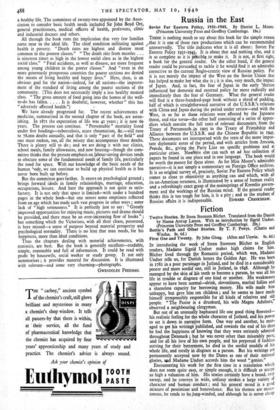Russia in the East
Soviet Far Eastern Policy, 1931-1945. By Harriet L. Moore (Princeton University Press and Geoffrey Cumberlege. 16s.)
THERE is nothing much to say about this book for the simple reason ,that it is one of those rare productions which can be recommended unreservedly. The title indicates what it is all about : Soviet Far Eastern Policy 1931-1945.. It is about that and nothing else, and it is as complete as it is possible to make it. It is not, at first sight, a book for the general reader. On the other hand, if the general reader could be persuaded to tackle it he would find it an admirable corrective to the current Anglo-centric view of Russian policy. For it is not merely the impact of the West on the Soviet Union that has helped to make her what she is ; it is also, very much, the impact of Japan. And, in fact, the fear of Japan in the early 'thirties influenced her domestic and external policy far more radically and immediately than the fear of- Germany. What the general reader will find is a three-hundred-page book without a shred of padding, half of which is straightforward narrative of the U.S.S.R.'s relations with China and Japan during the period under review—and with the West, in so far as these relations were -affected by the Japanese threat, and vice versa—the other half consisting of a series of appen- dices which contain the full texts of relevant documents, from the Treaty of Portsmouth-in 1905 to the Treaty of Friendship and Alliance between the U.S.S.R. and the Chinese Republic in 1945. These documents are interspersed with the texts of the more impor- tant diplomatic notes of the period, and with articles from lzvestia, Pravda, &c., giving the Party Line on specific problems and at particular crises. Nowhere else can such an ad hoc collection of papers be found in one place and in one language. The book would be worth the money for tktese alone. As for Miss Moore's admirable narrative—it is not simply a commentary on Foreign Office archives. It is an original survey of, precisely, Soviet Far Eastern Policy which comes as close to objectivity as anything can and which, with all its un-American terseness, is illuminated by a sense of human realit5 and a refreshingly exact grasp of the mainsprings of Kremlin govern- ment and the workings of the Russian mind. If the general reader thinks this is too tough for him, it is a pity ; and to the student of Russian affairs it is indispensable. EDWARD CRANKSHAW.


























 Previous page
Previous page